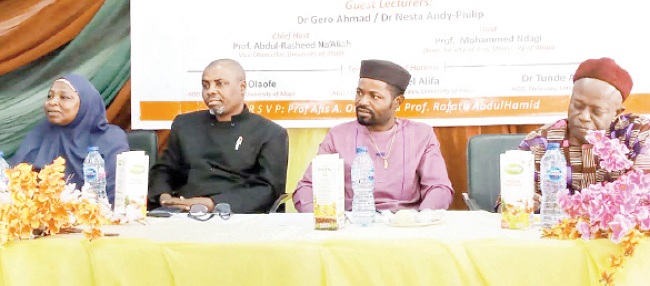[ad_1]
NIGERIANS have been advised to see one another as one and allow for peaceful coexistence as contained in the Qur’an and the Bible.
This advice was given by discussants at a symposium titled ‘Interfaith Relations and National Integration for Muslim and Christian Students’ which was held at the University of Abuja and sponsored by NRF 2020 TETfund Project.
The convener of the programme, a professor of Islamic Studies with specialisation in Islamic Thought and Gender Studies at the University of Abuja, Rafatu AbdulHamid, called on religious leaders to be sincere in their sermons and make their followers understand the true teachings of their religions.
Professor AbdulHamid, who is also the programme coordinator of the Centre for Gender, Security Studies and Youth Advancement at the university, stated that the programme was meant to let youths understand the importance of peace and religious tolerance to the birthing of a new Nigeria.
She described the programme as a national project which covers the six geopolitical zones with the aim of stemming religious violence, especially among youths in higher institutions in the country.
The don said: “This is a TETfund-grant project which we applied for and were given. I believe TETfund had seen the relevance of this project. It is a national project. We are looking at the six geopolitical zones within the federation because of the religious violence we have been experiencing in institutions of higher learning, especially among the youth.
“Many lives and property have been destroyed. We have seen cases of victims getting injured as a result of religious violence. This is as a result of lack of understanding among the different religions. We need not go beyond our limits and because we have seen massive destruction as a result of religious violence, we feel that people, especially the youth who we look upon as leaders of tomorrow, should be enlightened and educated.
“And because this is happening in our institutions with problems surrounding religious beliefs and practice, we feel it’s very necessary for us to call the students, train them, to get their views on the way forward so that we can achieve and sustain peace in our institutions of learning and Nigeria as a whole. There can only be development when there is peace and that is what we are interested in. We want interfaith relations to be embedded in General Studies in our schools so that students can live together in peace, love and harmony.”
The principal investigator of the project and former head of the Arabic and Islamic Studies, University of Ibadan, Professor Afis Oladosu, said the workshop was targeted at undergraduates with the purpose of data collection and addressing the lingering religious conflicts between Muslims and Christians in Nigeria.
Oladosu said the roles of students in the promotion of interfaith relations and national integration, given their exposure to education, could not be overemphasised.
He said: “This is a data-yielding workshop targeted at undergraduates and postgraduate students of the University of Abuja. The purpose is to collect data and raise questions afresh about the tense Nigeria’s conflictual situations, particularly between Christians and Muslims.”
“We realised that over time, attention has always been on the roles that Nigerian university undergraduates can play in the promotion of interfaith relations and by extension engendering national integration. This workshop is to listen to them as you could see.
“We are listening to their perspectives which shall be factored into our project sponsored by TETfund. The overall goal, as I mentioned, is how to use interfaith dialogue as a tool to promote national integration.
“If you have close to 150 participants here and all of them have bought into the idea that we need peace. They have friends they will take this message to and before you know it, the message is everywhere. Gradually, small drops of water make the ocean. That is the philosophy.”
Dr Gero Ahmed and Dr Nesta Andy Philips, both of Islamic Studies and Christian Religious Studies Departments of the University of Abuja, spoke on the topic ‘Though Tribe and Faith May Differ’ from the Islamic and Christian perspectives respectively.
The dons said the purpose of the creation of man is to testify the power of God over His creations.
They called on Muslims and Christians to live together in peace, saying the two religions lay emphasis on the sanctity of human lives.
The scholars agreed that it is time to find ways to achieve national harmony and cohesion through the promotion of mutual understanding and cooperation centred on open, honest and sincere interfaith engagements.
[ad_2]








